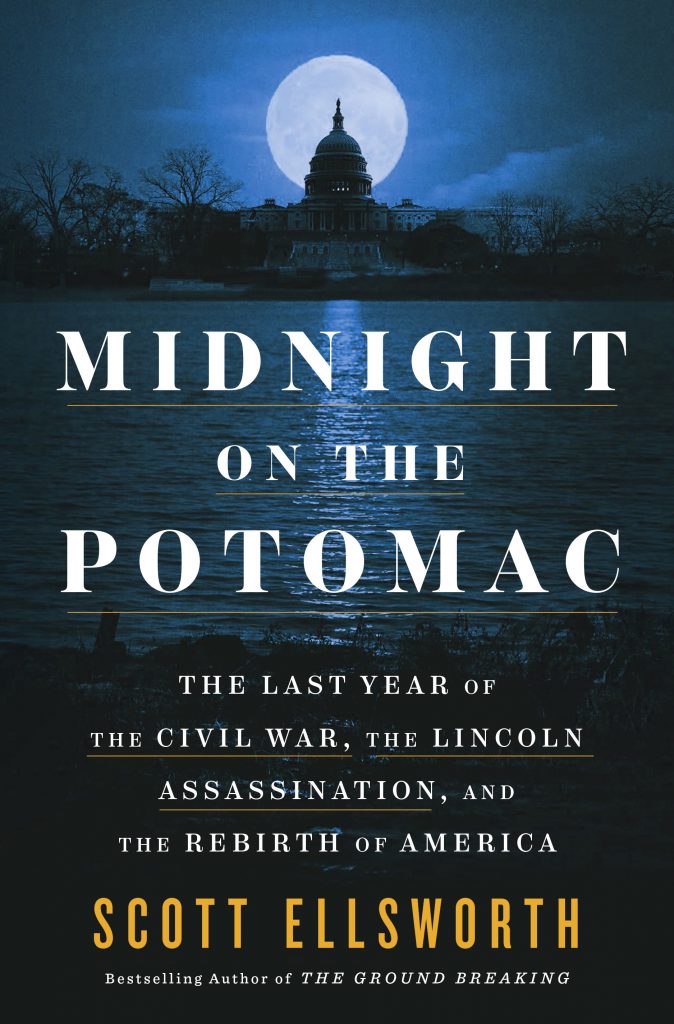by Bruce Sylvester / Troubadour, Thursdays 2 – 4 pm
A dark night of the American soul, the Civil War pitted brothers against brothers, states against states. Neither Union nor Confederacy had the full support of its citizens. Some southerners felt that only plantation owners would benefit from secession. As University of Michigan professor Scott Ellsworth writes in his thoroughly researched Midnight on the Potomac: The Last Year of the Civil War, the Lincoln Assassination, and the Rebirth of America (Dutton), “[T]hroughout the Confederacy, there were Union men and women whose voices, though silenced, remained steadfast. In the mountains of North Carolina and in parts of northern Alabama hill country where slavery was practically unknown, Confederate army recruiters had been shot at by the locals. When the state of Mississippi seceded from the Union, Jones County seceded from the state of Mississippi.” As Sherman and his forces marched through Georgia, Blacks escaping slavery joined his army, some becoming valuable spies and scouts since they knew their own region better than the invading Union army could.
The book digs deep into the conflict and its participants, blowing away stereotypes and facile assumptions. Quotes from letters of ordinary citizens are vivid, as are the descriptions of leading figures and others too. A Boston theater critic heaps praise on a performance by future Lincoln assassin John Wilkes Booth. A concise author, Ellsworth smoothly gets loads of information into relatively few words — for example, the background of self-made woman Laura Keane, the star of the play where theater-loving Lincoln was shot. We also learn of Confederate master spy Thomas Nelson Conrad and his impressive range of disguises.
Well into the war, Lincoln was careless about his own safety until a bullet went through his hat as he rode alone back to the White House one night. Innately conciliatory, he visited both wounded Union troops and rebel prisoners of war on a trip to a military hospital.
Booth (an acclaimed Shakespearean actor) is often assumed to have been the ringleader of the extended plot to assassinate various government officials — perhaps in part because he was the only one of the designated killers to get his mark. But not so. The Confederate Secret Service, which reached up into Canada, planned it. As an actor, Booth was hugely popular in Boston, but a fifth 1864 visit to this city — this one unexplained — seems to have been for a meeting with four other Secret Service men at the Parker House. The original plot was to kidnap Lincoln and ransom him for Confederate prisoners of war. The surrender of the South the next spring led to a change of goals.
Booth — the son and younger brother of noted actors who were anti-slavery — may be the most intriguing character of all here. Matinee-idol handsome, he was genuinely friendly to people of any station and political persuasion. He loved children so much that when young Tad Lincoln asked to meet him, he gave the boy roses regardless of a consuming hatred of his father.
As Ellsworth writes of the stage tragedian who then created his own tragedy to go down in history, “[N]ot only was Booth a remarkable Shakespearean — one whose portrayal of the mad king in Richard III thrilled a generation of playgoers — but his own life was a tragedy all its own. Blinded by racism, manipulated by others, and obsessed with anger and hatred, he not only murdered a great leader but, at age 26, threw away his own life as well. It’s a story that Shakespeare would well have understood.”

